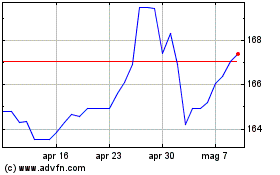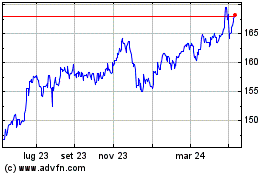Euro Falls Amid Risk Aversion On U.S. Political Turmoil
17 Maggio 2017 - 8:41AM
RTTF2
The euro slipped against its most major counterparts in the
European session on Wednesday, as European shares declined on
intensifying worries about the Trump administration, following the
allegation that the U.S. President Donald Trump had asked former
FBI Director James Comey to drop a probe into former national
security advisor, Michael Flynn.
Congressional Republicans showed growing concern over the
controversy, with the House oversight committee chairman Jason
Chaffetz demanding the FBI to produce all communications between
President Donald Trump and former FBI director James Comey.
Also, Trump took to Twitter to defend his sharing of what is
reportedly highly classified information with Russia during an Oval
Office meeting last week, saying he had the "absolute right" as
president to give "facts pertaining to terrorism and airline flight
safety" in the fight against ISIS and terrorism.
Final data from Eurostat showed that Eurozone inflation
accelerated as estimated in April.
Headline inflation climbed to 1.9 percent from 1.5 percent in
March. Inflation has returned to the the European Central Bank's
target of 'below, but close to 2 percent.'
Core inflation that excludes energy, food, alcohol & tobacco
accelerated to 1.2 percent from 0.7 percent in March. The latest
level was the highest since September 2013.
The euro showed mixed performance in the Asian session. While
the currency held steady against the franc and the pound, it rose
against the greenback. Against the yen, it declined.
The euro eased to 1.1080 against the greenback, from more than a
6-month high of 1.1122 hit at 2:30 am ET. The next possible support
for the euro-greenback pair is seen around the 1.10 region.
The 19-nation currency weakened to a 2-day low of 124.50 against
the Japanese yen, compared to 125.36 hit late New York Tuesday. If
the euro-yen pair extends decline, 122.00 is likely seen as its
next support level.
Figures from the Ministry of Economy, Trade and Industry showed
that Japan's industrial production declined less than initially
estimated in March.
Industrial production fell 1.9 percent month-over-month in March
instead of a 2.1 percent decrease reported earlier.
Reversing from an early near a 2-month high of 0.8615 against
the pound, the euro edged down to 0.8562. Continuation of the
euro's downtrend may see it challenging support around the 0.84
area.
Data from the Office for National Statistics showed that the UK
unemployment rate dropped in the first quarter.
The ILO jobless rate came in at 4.6 percent in three months to
March, the lowest since 1975. The rate dropped from 5.1 percent in
the prior year and 4.8 percent in the fourth quarter of 2016.
On the flip side, the euro bounced off to 1.0924 against the
Swiss franc, from an 8-day low of 1.0905 hit at 3:15 am ET. The
euro is likely to locate resistance around the 1.12 level.
Looking ahead, Canada manufacturing sales for March are set for
release at 8:30 am ET.
Grafico Cross Euro vs Yen (FX:EURJPY)
Da Mar 2024 a Apr 2024

Grafico Cross Euro vs Yen (FX:EURJPY)
Da Apr 2023 a Apr 2024
